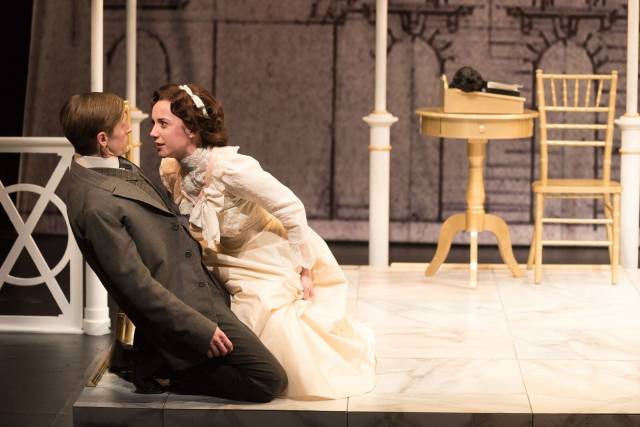

George Bernard Shaw’s seldom-seen Widowers’ Houses—produced by The Actors Company Theatre (TACT) and Gingold Theatrical Group at the Beckett Theatre—was first performed in 1892, although a preliminary version of the play was drafted much earlier. The first of Shaw’s plays to come to the stage, its script was later published along with those of two other Shaw plays (The Philanderer and Mrs. Warren’s Profession) under the title Plays Unpleasant.
At the time of Widowers’ Houses’ creation, drama critic Shaw was steeped in the work of Henrik Ibsen, whose dramas dealt with social problems of the day. With his “unpleasant” plays Shaw embraced the idea that the English theatre—like Ibsen’s Norwegian one—could serve not only an entertainment center, but also as a forum for examining modern ethical dilemmas.
The issue at hand in this drama is the scourge of poverty. A young Englishman named Trench (Jeremy Beck) meets and romances a fellow Londoner, Blanche Sartorious (Talene Monahon) while on holiday in Germany. A match seems to be made. But soon Trench discovers that Blanche’s father (Terry Layman) has gained his wealth as a London “slum landlord.” Trench is initially scandalized and outraged. But he topples quickly from his high horse upon learning from Sartorius that he himself has enjoyed financial gain from the existence of those very same ill-kept rental properties. Shaw is interested in how youthful idealism gives way to cynical pragmatism. Such falls from grace may seem tragic, but in the case of Widowers’ Houses, the play ends with an agreement of marriage, so at least in that respect it’s a comedy. The current production, directed by David Staller, is subtitled “A comedy of sex, greed and real estate.”

On the other hand, I doubt that the script was ever meant to be played as a farce. In many scenes in the production, however—notably, the early ones—farce seems to be Staller’s game. The production’s music cues suggest Gay Nineties jollity, and Brian Prather’s elegant unit set looks like it might be a loaner from a production of The Importance of Being Earnest. The initial scenes between Trench and his traveling companion, the effusive William De Burgh Cokane (Jonathan Hadley) are played with broad comic strokes. At one point a stereotypically saucy waitress (Hanna Cheek, who later portrays a parlor maid) brings the chaps cartoonish mugs of beer with foamy heads that seem to be fashioned from Styrofoam. Directly after Trench kisses Blanche, he whoops like a giddy cowhand.
Later scenes are much more subdued—and the characters come off as humans rather than caricatures. Perhaps Staller meant to switch to a more naturalistic mode as the story’s serious themes emerge. (A director’s note in the program about Shaw’s subversion of familiar stock characters suggests that that may be the case.) But it’s hard to take the characters seriously when they’ve previously behaved so clownishly.
One actor who does well at bridging the gap between the two modes of playing is Layman, who gives a thoughtful, well-modulated performance. Another is John Plumpis as Sartorius’s cringing rent collector Lickcheese, whose unlikely transformation to newly moneyed swell is as thorough as that of Eliza Doolittle from scrubby flower girl to fair lady in Shaw’s Pygmalion.